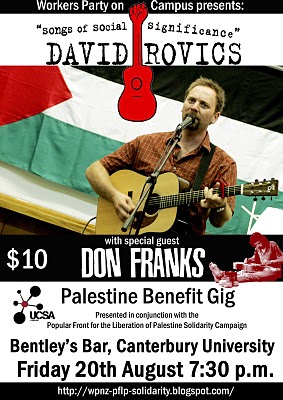
Purchase tickets on line here: http://wpnz-pflp-solidarity.blogspot.com/p/david-rovics-don-franks.html
Greece Interview: "To have a general strike in Greece it is not such a big deal"
The Spark July 2010
In the last issue of The Spark we reported on recent events from the class struggle in Greece. Some of the fiercest popular resistance to the current crisis of capitalism has erupted in Greece over the last couple of years. The latest chapter in this unfolding drama has been the revelation that Greece is unable to pay back the huge foreign debt that it has accumulated during its years of economic growth since joining the eurozone in 2001. According to a report by Costas Lapavitsas and other economists (http://tiny.cc/a7e05), the debt crisis is an inevitable consequence of the structure of the eurozone, which is extremely hierarchical.
A “core” comprising the richest countries (Belgium, France, Germany and Netherlands) dominates the “periphery” (Greece, Ireland, Italy, Portugal and Spain). Germany has acquired the dominant position in the capitalist “race to the bottom” by squeezing its workers hard in the aftermath of reunification. German politicians and newspapers have been busy whipping up resentment against “profligate” Greeks, since a large chunk of the cost of the bailout package will fall on the German working class. However, it is only the militancy of the Greek workers that have prevented their living standards being pushed down even further than their already low level. It is time for German and other workers to start “learning Greek”!
Mike Kay, industrial officer for the Workers Party, who travelled in Greece in June, spoke to Stavros and Paulin from the OKDE (Organisation of Communist Internationalists of Greece) in Athens.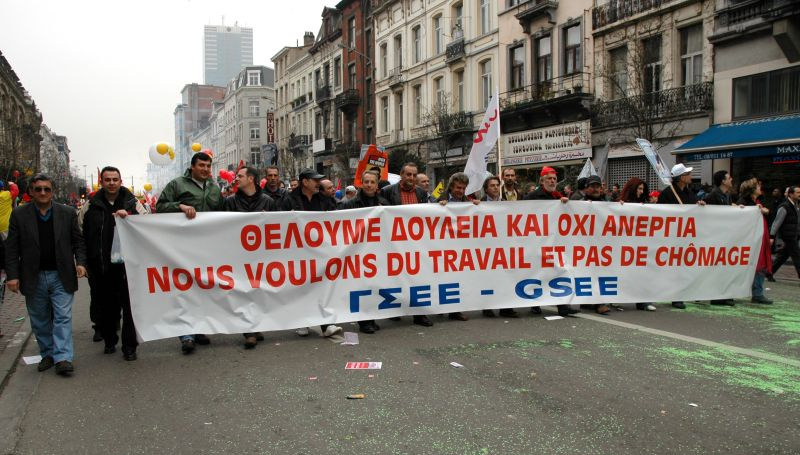 Continue reading “Greece Interview: "To have a general strike in Greece it is not such a big deal"”
Continue reading “Greece Interview: "To have a general strike in Greece it is not such a big deal"”
TEN YEARS MAKING MILITANT NOISE
This year, Wellington group Brass Razoo Solidarity Band clocked up its tenth year of street performances in support of workers’ strikes and anti-war marches.
The Spark talked to BRSB founder Don Franks.
Spark: How did the band start off?
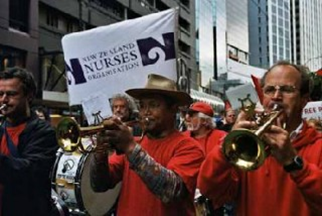
Don: For a long time I’ve contributed little bits of music to support workers’ battles, like making up songs and singing them on picket lines with my banjo. One day I bought this ancient tenor horn for twenty bucks. My idea was to stick it on the wall as an ornament but when I tried blowing I found it still worked. Next day I took it to blarp at an anti-sow crate demo, where they wanted lots of noise. Walking home afterwards, I envisaged lots of horns being played properly at a demo. I recalled that postie John Maynard had played cornet when he was a kid, so I rang him up and said “John, how about we make a union band?” He was keen, and it took off from there. Five of us got together and began rehearsing a rough garage group with a cornet, tenor horn, tuba, snare drum, and a bass drum made out of a rubbish bin. Continue reading “TEN YEARS MAKING MILITANT NOISE”
For a campaign of solidarity with the Palestinian struggle
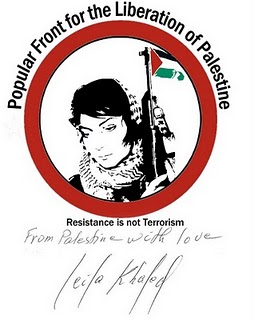
Philip Ferguson, national organiser, Workers Party
The Israeli invasion of the Gaza Strip at the start of 2009 brought home to many people around the world the brutality of the state of Israel. Hopefully it spurred a lot more people to get involved in supporting the cause of Palestinian liberation. In New Zealand, although there are activists campaigning around issues in Israel/Palestine, the campaigning remains both numerically and politically weak.
There is a strong tendency in New Zealand, for instance, to emphasise justice for Palestinians rather than solidarity with Palestinians. The differences between these few words , which may seem trivial, are actually immense at a political level.
If you are in favour of something for people, it suggests that they cannot fight for it themselves and so you are campaigning for it on their behalf. This essentially portrays the oppressed as passive victims. But the Palestinians are not passive victims – they are an oppressed people and they are fighting every day for their liberation, regardless of what people sitting comfortably in the West are doing or not doing. The notion of doing something for people is essentially condescending.
On the other hand, if you are in solidarity with people, it suggests that these are folks struggling for their rights and you are providing active support for their struggle. You are not replacing their struggle, you are not the struggle, you are carrying out your own struggle as a form of active support of their struggle. Continue reading “For a campaign of solidarity with the Palestinian struggle”
Facebook Shuts Down Palestinian Solidarity Group

The US-based social networking site Facebook has shut down a New Zealand based PFLP Solidarity group, as well as permanently closing the accounts of all four group administrators with no right of appeal. The group, which had approximately 500 members, was established after the recent Flotilla attacks to show solidarity with the Popular Front for the Liberation of Palestine (PFLP), and raise awareness of the solidarity campaign led by the Workers Party of New Zealand, who are fundraising for the PFLP.
None of the administrators of the PFLP Solidarity group were given any
notice from Facebook that they had violated terms or conditions, and were given no direct reason as to why they had had their accounts disabled.
“They did not even send an email to me explaining why my account was disabled”, said one of the group’s administrators.
Marika Pratley, PFLP Solidarity Campaign coordinator and group
administrator in Wellington said, “This was clearly a political attack against the PFLP and an attempt by Facebook to censor and shut down the solidarity campaign”.
The PFLP advocates a single secular state in all of Palestine, with equal
rights for all, regardless of race or religion, and is the second largest
group in the PLO. Facebook have deemed that support for the PFLP violates its terms and conditions while allowing many blatantly racist anti-Palestinian groups to continue to exist without such censorship.
The Workers Party believes that all political ideas and discussion should be free of censorship on the internet, but wishes to expose this hypocrisy, which often surrounds debate of the Palestine issue. Palestinian groups are frequently censored and branded as terrorists while supporters of the racist state of Israel are not.
The PFLP Solidarity Campaign is determined to continue on, despite
Facebook’s censorship. “We have already raised over $1000 through selling T Shirts. Deleting a Facebook group is not going to stop us showing solidarity with Palestine or the PFLP”, said Christchurch administrator Mike Walker.
CARD TRICKS
By Don Franks
It was a normal start up on our job the other day, cleaners hurrying in to dump coats and sort out gear for the early morning shift.
Our supervisor cast an eagle eye around the crew.
“Ok, everyone’s all here – anyone need any stuff?”
” Yes, couple of things”
“What?”
“Can we have a minibar and a masseur in our cubby hole?”
Everyone laughed a bit including the boss.
“There’s no bloody credit cards on this job and you’re not MPs with time to fiddle them. Ok, lets get on with it.” Continue reading “CARD TRICKS”
BP Oil Spill and the Exposure of Obama
On April 20, BP’s offshore oil-rig Deepwater Horizon exploded off the coast of Louisiana. Eleven workers are missing, presumed dead, while 17 more were injured. The ensuing pipeline breach has garnered extensive media attention, as around 210,000 gallons of oil a day gush into the Gulf of Mexico, destroying local wildlife and the fishing industry.
Louisiana, responsible for a third of the country’s fish catch, are already seeing massive loss of marine-life as the oil sheen enters the South Pass, a major channel for fishing. In addition to the loss of marine life, oil threatens to destroy the wetlands, making states more vulnerable to events such as Hurricane Katrina – especially if currents push the oil further up the East Coast.
This disaster has thrown the relationship between government and big business into stark relief, as US President Barack Obama continues to plummet in opinion polls. Sections of the environmentalist movement had placed faith in Obama as a progressive candidate, hoping to see an end to the Bush administration’s dismal environmental record.
Continue reading “BP Oil Spill and the Exposure of Obama”
Marxism 2010
The Workers Party held its annual conference in Wellington June 4-6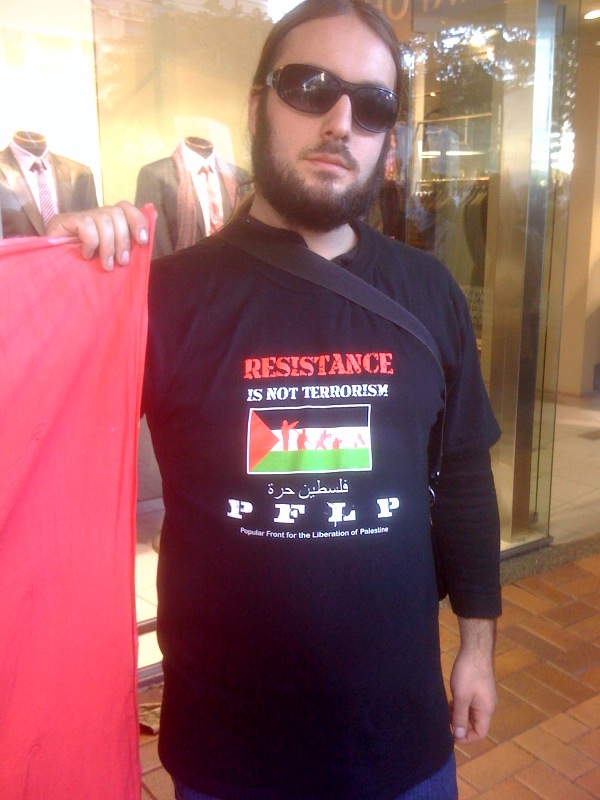
The conference opened with Daphna Whitmore speaking on the revolutionary movement in India that spreads from the border with Nepal in the north to the southern states of India. John Edmundson spoke on Afghanistan and the quagmire the invading powers find themselves in. Continue reading “Marxism 2010”
WHAT IS MARXISM?
A talk by Don Franks, Marxism 2010 conference, Wellington 5 June 2010
This is obviously a big subject, which could be approached in a number of ways. In the small time we have this morning, my aim will be to introduce basic points and hopefully arouse some ongoing interest.
Ther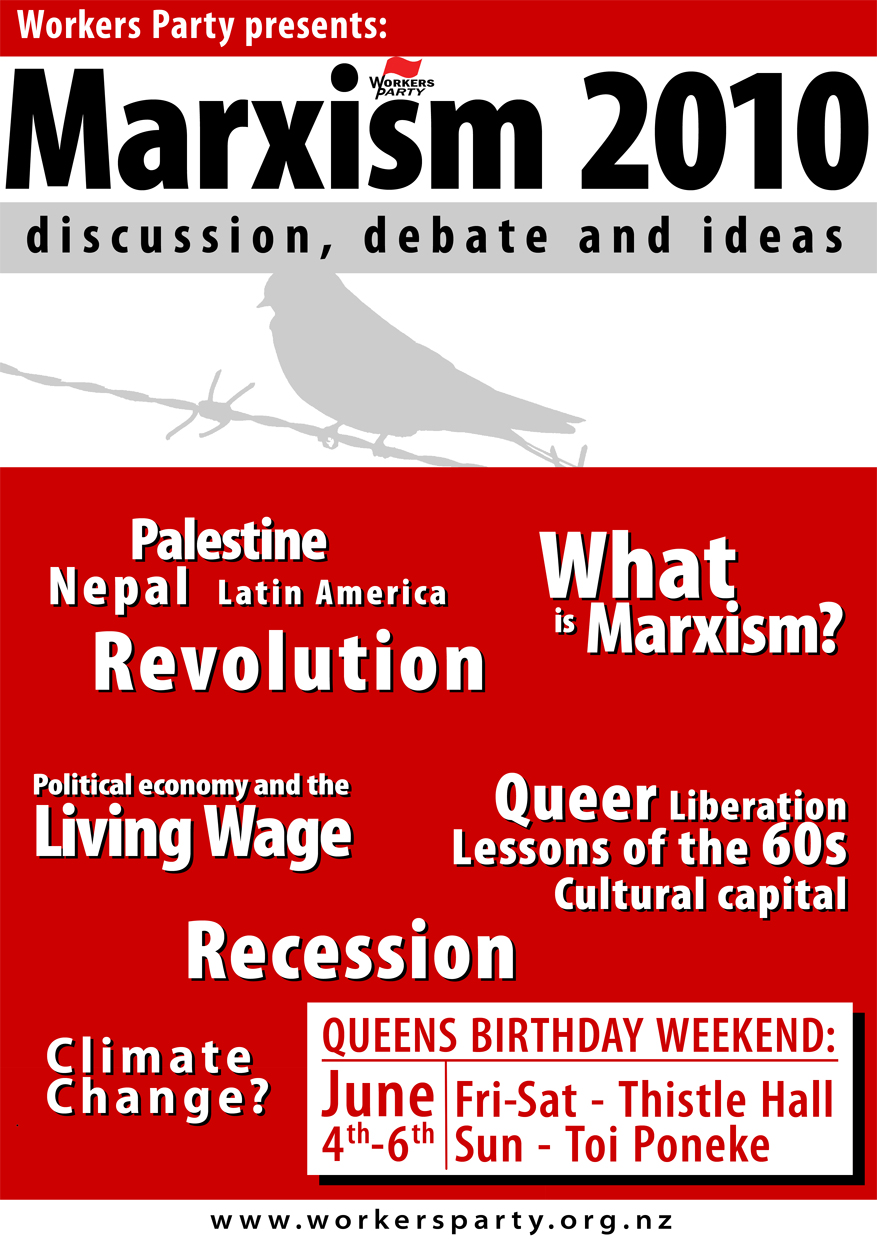 e are various contending definitions of ‘Marxism”. The one I’m tempted to offer today is that Marxism is a set of sharp political tools, which New Zealand leftists tend to leave in the box. Later on in this talk I’ll consider why that has been so frequently the case.
e are various contending definitions of ‘Marxism”. The one I’m tempted to offer today is that Marxism is a set of sharp political tools, which New Zealand leftists tend to leave in the box. Later on in this talk I’ll consider why that has been so frequently the case.
As a more general definition to introduce Marxism, I’ll add that it’s a theory named for its main architect and can be understood as the theory of dialectical materialism based on communist practice. The expression ‘dialectical materialism’ has a forbidding sound and is not common currency in the day-to-day life of most people. Here I see a huge contradiction, because dialectical materialism is a thoroughly practical method of understanding human society and the universe in which we’re placed. Dialectical materialism is also a philosophy which by its nature takes sides with the oppressed. Continue reading “WHAT IS MARXISM?”
"To have a general strike in Greece it is not such a big deal"
Mike Kay spoke to Stavros and Paulin from OKDE (Organisation of Communist Internationalists of Greece) in Athens.

MK: Greece has been the focus of much of the debate about the problems of the European economy. Why does it occupy this special positon?
OKDE: For several reasons, Greece is the weak link in the chain of the European Union (EU). Firstly, due to the weakness of Greek capital due to the reduction in the productive bases of industry and agriculture. Secondly, because of the weaknesses in the EU as a whole – renegotiation or non-payment of “toxic” debt may lead to the collapse of German and French banks. This maybe enough to set off a “domino effect” leading to the collapse of several countries’ economies. Thirdly, there is the Greek movement against austerity, of which the latest pact from the International Monetary Fund (IMF) and EU is trying to break the backbone. Lastly, there is a very deep political crisis; the disintegration of the Pasok (Socialist party) government may have already begun. Continue reading “"To have a general strike in Greece it is not such a big deal"”
